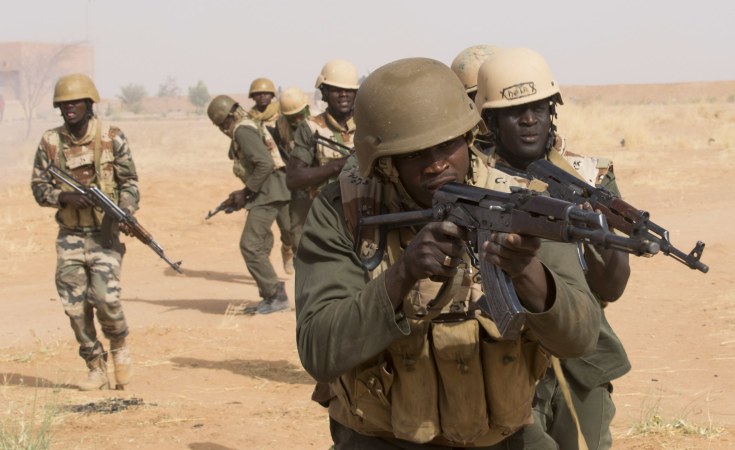The government of Niger risks inflaming local conflicts in a region bordering Mali by pursuing a primarily military strategy to counter attacks by Islamist militants, says a new report issued Wednesday.
The report, by the Brussels-based International Crisis Group (ICG), says the militant group called Islamic State could exploit the conflicts between and within communities in the northern Tillabéri region.
"Two years ago, Niger suspended counter-terrorism cooperation with Malian militias and shifted to outreach to communities [in Tillabéri] where jihadists are present," said said Hannah Armstrong, the ICG's senior analyst for the Sahel. "But after militants killed local leaders and launched even deadlier attacks, Niger has returned to a military approach."
Jean-Hervé Jezequel, ICG's Sahel project director added: "What military success [the government] has achieved in the past has often yielded short-term gains at considerable cost to long-term relations with border communities.
"By focusing primarily on a military strategy, the government risks again inflaming local conflicts that Islamic State could exploit. Instead, it should pursue political efforts in parallel."
Armstrong said Niger should deal with Islamic State as "not just as a security threat but also as a governance competitor for the state. Its containment will require Niger to develop an ambitious and coordinated political response to win back border communities."
The executive summary of the ICG report follows:
In December 2019 and January 2020, Nigerien security forces suffered their deadliest attacks ever, losing scores of troops in ferocious assaults mounted by the Sahel's Islamic State franchise operating in Mali and Niger's Tillabery border region. The militants struck over a year after Niamey suspended working with Malian ethno-political militias, a decision taken after authorities saw how that pact triggered bloodletting among competing nomadic tribes in the area, which in turn drove some of them further into the Islamic State's hands.
After that, Niger moved toward outreach to Tillabery residents in a bid to win their loyalty back. But these efforts also failed and, following the recent incidents, Niamey embarked on a new offensive. By focusing primarily on a military strategy, the government risks again enflaming local conflicts that the Islamic State could exploit. It should pursue parallel political efforts to build peace among border communities and develop stronger ties with them. In addition, through dialogue, it should probe ways to peel local youths away from jihadist groups.
Following the lethal attacks at the end of 2019, and an initial retreat, Niamey has attempted to regain ground in brutal counter-terrorism operations with the support of and possibly under pressure from France, which maintains thousands of troops in the region. The new military push has already led to an alarming escalation in alleged killings of civilians by security forces, however, creating a situation that jihadists could exploit to win more recruits. A similar situation occurred in 2017-2018, when Niger partnered with Malian ethnic militias that were considered rivals to certain ethnic communities, particularly the Peul, many of whom allied with the Islamic State as a result.
Niamey should not make the same, or similar, mistakes again, especially now that it faces a COVID-19 pandemic that threatens to weaken or even immobilise its government and military while also reducing the capacity of the authorities and monitoring organisations to keep an eye on the behaviour of troops on the ground.
Border communities, which have learned to live by the gun in the last two decades, have become increasingly hostile to the state. Niger's government has recently made attempts to woo them back but failed to achieve key goals. Multiple uncoordinated and overlapping state-led dialogue and disarmament initiatives have led to confusion. State-backed efforts to recruit locals into the security forces have also been compromised by nepotism and corruption, resulting in poor recruitment numbers from some constituencies, notably the Peul.
It has thus become harder to persuade border zone residents that the government can offer them more than the jihadists, who increasingly present themselves as the state's competition in governance. Nor have locals convinced many of the Islamic State's rank and file to surrender, as Niamey hoped its outreach would sway them to do.
There are limits to what Niger can do, especially since the Islamic State is present not just in Tillabery but also across the border in Mali - and increasingly in neighbouring Burkina Faso. Nevertheless, Niamey's political management of the crisis in Tillabery will be critical if it is to have a chance of thwarting the Islamic State's ascendancy within Nigerien borders.
Authorities should deal with the Islamic State not just as a security threat but also as a governance competitor. Its containment will require Niger to develop an ambitious and coordinated political response to border communities' alienation. Even then authorities must tread delicately, so as not to expose those people to the Islamic State's retaliation if they cooperate with the government.
Niger can start by identifying and working to resolve conflicts among and within border communities, where the Islamic State finds many of its recruits. It should pursue dialogue with the jihadists themselves to explore what might entice them to leave the Islamic State's ranks.
Foreign partners - notably France and the U.S. - should take note that, at times, Niger's efforts to build dialogue with Islamic State commanders may require them to step back from pursuing short-term counter-terrorism objectives that present long-term obstacles.
Finally, Niamey should apply itself to addressing the grievances, from under-representation of groups such as the Peul in state security forces to land rights, that have alienated Nigeriens living on the country's border with Mali. Addressing those will not bring an immediate end to conflict, but it may begin to create the conditions for a more peaceful future.


